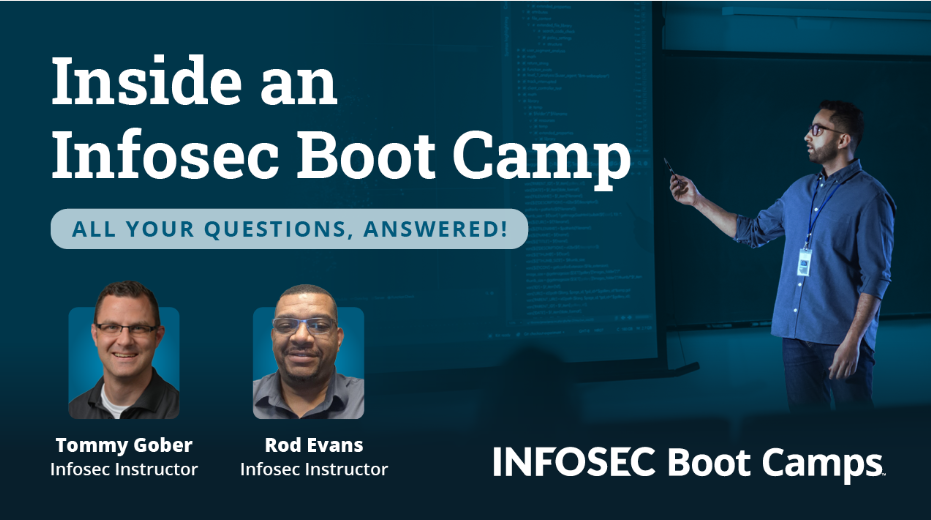A federal guide: 5 things to know before you buy your Infosec boot camp

If you’re in the armed forces, a Department of Defense contractor or a federal employee and are considering enrolling in an Infosec Boot Camp, this guide is for you. Choosing a training provider to invest your time and resources in is an important decision — and you should fully understand what you’re getting out of that investment.

Infosec has a proven track record going back more than two decades. 75% of our students work for government agencies. According to the Cengage Work Learner Outcomes Report, 92% of cybersecurity learners who sat for certification exams passed.
Here are a few things you should consider before you enroll in an upcoming boot camp.
Continue reading
Sorry, we're unable to load the form at the moment. Please check your browser's settings to confirm the form is not blocked. You can contact us and report the issue here: infosec.info@cengage.com.
If you’re in the armed forces, a Department of Defense contractor or a federal employee and are considering enrolling in an Infosec Boot Camp, this guide is for you. Choosing a training provider to invest your time and resources in is an important decision — and you should fully understand what you’re getting out of that investment.

Infosec has a proven track record going back more than two decades. 75% of our students work for government agencies. According to the Cengage Work Learner Outcomes Report, 92% of cybersecurity learners who sat for certification exams passed.
Here are a few things you should consider before you enroll in an upcoming boot camp.
1. Know what you’re buying: What’s included in your Infosec boot camp?
A live certification boot camp, whether in-person or live online, is a short-term, intensive training in a structured environment. Certification boot camps typically last three to seven days and are your fastest route to certification.
By enrolling in an Infosec Boot Camp, you benefit from:
- Expert instructors with 10+ years of industry experience
- Study materials and practice tests
- An exam voucher for most boot camps
- Hands-on labs for most boot camps
- Exam Pass Guarantee
- 100% Satisfaction Guarantee
- Free 90-day Infosec Skills access (1,400+ additional courses and labs)
- Financing and flexible payments
FREE role-guided training plans

"My instructor was great," said Russel Kirkland of the U.S. Army. "He went into detail on network security concepts and showed us what attacks would look like. It was extremely helpful to see what an attack looks like in real-time and what kind of security measures can be taken for each."
2. Embrace the intensity: A typical Infosec boot camp day
A normal Infosec Boot Camp day runs from around 8 a.m. to 5 p.m. You get scheduled breaks in the morning and afternoon, as well as an additional 60 to 90 minutes of dedicated study time. The actual times vary from one class to the next according to the material covered.
Infosec instructor Steve Spearman compares the volume of knowledge learned in a boot camp to the equivalent of doing an hour or so of studying a day for three months. He adds, “It’s like drinking from a fire hose for six days. The boot camp is going to be the most effective way to study because you can get in, get it done, get out and pass the exam.”
Students tend to like the fast-paced structure because they can accomplish so much relatively quickly.
“The boot camp was highly efficient, only needing one week of my time,” said Lili-Ann Mitchell of Mirades Security, who took the CISM Boot Camp. “It’s awesome because you close everything for that week. If it was a day here and there, I don’t think it would be as efficient. I loved it. It was tough, but the speed and the content made it digestible.”
"The course was extremely helpful and provided exactly what we needed to know in order to successfully navigate the exam. Without this I am not confident I would have passed." --Robert Caldwell, Salient Federal Solutions "
FREE role-guided training plans

3. Prepare before your Infosec boot camp: Set yourself up for success
You won’t instantly jump from 0 to 100 by taking a three- to seven-day boot camp. To get this degree of transformational learning, you should take an immersive, longer-form boot camp.
To get a good head start, review the exam outlines so you know what’s coming your way. Also, make sure you’re familiar with the specific topics and skills that each exam tests, said Infosec Instructor Tommy Gober.
“I encourage folks to print [the exam objectives], keep a copy on hand and then go through them with a pen, checking off things as you understand them,” explained Gober. “If you can describe what this bullet point is about to your cat, to your neighbor’s fence, post, whatever, put a line through it. Then, if you don’t understand it. Skip it and move on. Do a real, honest, personal assessment of the content. Then, once everything’s checked off, guess what? You’re ready to go.”
Also, learn the terminology and acronyms, said Gober. The terminology on the exam is “the biggest stumbling block” for many students.
You should also complete all the available pre-study materials, which are designed to help you from the moment you enroll. Doing all of this will help you to make the most of the time you have with a live instructor.
Make time to study: Prioritize your learning
As with most training programs, success during your boot camp depends on making sure you have enough time and energy to get the most from the course.
Step one is to clear your schedule. It’s extremely difficult — and perhaps impossible — to multitask during a boot camp and still absorb all the material. Distractions, such as work or personal obligations, can derail your study process. You want to make learning the material your job.
In addition to the time you spend in your boot camp, you also want to allocate between an hour and an hour and a half for studying. As Gober explained, “You can’t be checking email and phone calls or coming in and out — you have to focus on the learning.”
4. Don’t overestimate your current skills: Embrace a beginner’s mindset
Regardless of your cybersecurity experience level, the best mindset to assume is that of a beginner. There’s often a gap between real-world knowledge and exam-specific understanding.
Infosec Instructor Rod Evans puts it this way: “Understand what you know, but don’t come in thinking you know it all because these tests have a way of humbling people who have been in the field for 30 years. There are three ways of knowing this material: the way you know it, the way the industry wants you to know it and the way the partners — CompTIA, EC Council and others — want you to know it.”
Gober concurs, adding, “There’s the real-world answer to what you would do, and then there’s the test answer of what you would do.” In the exam context, the test answer is the only one that will help you earn a passing score.
"Great coverage of what is needed for the test. My instructor was an expert in the material, as well as an expert in the field with vast experience in related fields. His Class was so interesting, that nothing was able to interfere in my interest in completing this class." - Ignacio Hernandez, Army
5. Ask questions: Leverage your instructor’s 10-plus years of experience, passion and caring
One of the most unique benefits of a live Infosec Boot Camp is you get an experienced industry professional who is ready to answer your questions and genuinely cares about your success. To qualify to be an Infosec instructor, an individual needs to have at least 10 years of industry experience.
Infosec instructors also benefit from a positive learning culture within Infosec. They come from diverse working backgrounds and openly share tips and knowledge with each other. Further, as Evans explained, they “won’t teach something that they don’t have certifications on themselves.” He continued, “We don’t read slides to you. We don’t treat people like they are numbers. We are here to help you with the content.”
The fact that Infosec instructors are focused on answering your questions and helping you tackle real-world problems has had a positive impact on many students, including Erik Heiss of the United States Air Force. “The instructor was able to take material that prior to the class had made no sense and explained it in real-world scenarios that were able to be understood.”
To fully leverage the expertise and knowledge of your instructor, you should actively engage in the boot camp by participating in discussions and asking plenty of questions. If there’s anything you don’t understand, don’t hesitate to get clarification. No question is too small or insignificant, so feel free to speak up.
Evans underscores the value of students reaching out with questions. “Ask questions — we are not mind readers,” he said, “There is no such thing as a dumb question — except the questions that are not asked.”
Don’t wait too long to take the exam: Capitalize on your boot camp knowledge
Regardless of how much you know immediately after the boot camp, it’s natural for facts and skills to fade over time, so it’s best to take your exam as soon as possible. In many in-person boot camps, you may be able to take the test after the last session of the camp.
If the test isn’t immediately available, Infosec instructors advise that you take it on the Monday or Tuesday after you’ve completed your boot camp. This is especially important for busy professionals because, as Evans said, “Life happens. You are never going to study later. Take the exam right after the boot camp.”
What to know about an Infosec boot camp
To take full advantage of your Infosec Boot Camp, its structure and instructors, you should understand what’s included, embrace the intense pace of learning, prepare ahead of time and prioritize your learning during the boot camp. It’s also important to approach the learning process with the mindset of a beginner, ask plenty of questions and take the exam as soon as possible after the camp’s conclusion.
While it’s important to evaluate your purchase, you also don’t want to let over-analysis or perfection prevent you from moving ahead. An Infosec Boot Camp is the fastest way to attain your goal of earning a top-tier cybersecurity certification, so embrace the opportunity to take a confident step toward your goals and dreams.
Ellen Pincus is a communication and marketing professional with over a decade of creative experience helping innovative organizations differentiate their voice. As the content marketing specialist for Infosec, she enjoys empowering cyber professionals and students with skills and knowledge to advance their careers and outsmart cybercrime.
Get unlimited and self-paced training for you or teams in your organization with Infosec Skills.
- 190+ role-guided learning paths
- 100s of hands-on labs & cyber ranges
- Custom certification practice exams
Get certified and advance your career!
- Exam Pass Guarantee
- Live instruction
- CompTIA, ISACA, ISC2, Cisco, Microsoft and more!



